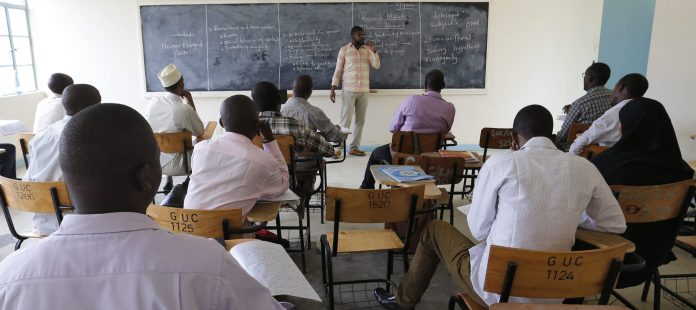Miracle Akubuo
The government plays a vital role in steering and controlling the affairs of a state or country. However, in Nigeria, the government’s performance can be perceived in two contrasting ways: as either good or bad. So, where does Nigeria stand?
Nigeria is a blessed country, rich in assorted resources, unique languages, diverse cultures, and much more. As a developing nation, Nigeria should be progressing steadily. However, due to poor implementation and policy formulations, the country seems to have lost its direction.
Throughout its history, Nigeria has faced various challenges, from military coups to civil and Biafra wars, leaving behind a trail of bitter memories. These experiences were meant to serve as lessons for improvement, but sadly, they seem to have weakened our resolve.
Nigeria has become a visionless, racially divided, and highly unpredictable nation. In recent years, the country has been plagued by a rampant issue; Insecurity has become the norm in Nigeria.
While the government makes efforts to tackle these problems, it lacks accountability, transparency, and, worst of all, the trust of its citizens. This lack of trust has created a loophole for the government, as citizens no longer rely on official statements but instead believe rumors. It is disheartening to witness the erosion of trust caused by the government’s lack of transparency, as it undermines the potential for good governance.
One critical aspect deeply affected by the government’s negative role is education.
Education is a crucial factor that distinguishes the olden ways from the modern era. Modern education is the determining factor for a successful state or country.
Therefore, it is essential for fostering good governance.
However, the limitations imposed by bad governance have hindered access to education for many in Nigeria. The education sector is grappling with numerous problems that require immediate action to secure the future of the country.
Former Vice-Chancellor of Bell University of Technology, Professor Adebayo Adeyemi, emphasizes that poor funding, mismanagement, insecurity, and the COVID-19 pandemic have contributed to the sector’s current low rating.
The National President of the All Nigeria Confederation of Principals of Secondary Schools (NNCIPS), Mr. Anselm Isuagie, highlights that as long as governments allocate less than 26 percent of their annual budget to education, the sector will not yield the desired results. The allocation to the sector is nothing to celebrate because the federal government has not faithfully adhered to its agreements.
According to research conducted in 2021, Nigeria, Africa’s largest economy, has the highest dropout rate in Africa at 16.9 percent, followed by Ethiopia. While Nigeria may boast the title of the “Giant of Africa,” it seems to be merely an empty accolade.
We should be setting a positive example in education, economy, security, and other areas for both underdeveloped and developed African nations. Unfortunately, the reverse is true in our country.
Another research finding highlights the failure of empowerment schemes and programs intended to assist uneducated youth and those who are educated but unemployed. These schemes should be well-maintained to promote the country’s economic growth and empower youths to become self-employed entrepreneurs. Regrettably, lack of accountability and transparency on the part of the government has prevented the effective management and updating of these schemes.
Taking the N-Power Empowerment scheme as an example, which was initially established by President Muhammadu Buhari to combat youth unemployment, the program has regrettably fallen victim to favoritism, ethnic biases, and political interference. These problems have further exacerbated the challenges faced by the education sector, particularly in tertiary education, where bribery and corruption have become pervasive issues.
This brings us to the grave concern of insecurity, which has become rampant in Nigeria. Insecurity has replaced security as the prevailing state of affairs in our nation, and its intensity continues to escalate with each passing day.
Kidnappings, ritual killings, and the increasingly popular cybercrime epidemic have permeated every corner of the country. Furthermore, the disheartening saying, “SCHOOL NA SCAM,” has gained traction among the youth. From the Southeast to the Southwest, and most alarmingly in the northern regions, the peace of mind of citizens is at the mercy of bandits, IPOB, Fulani herdsmen, and Boko Haram.
These destructive forces have brought our country to its knees, rendering many Nigerians homeless and forcing them to seek refuge in camps due to the desolation of their former homes. In such dire circumstances, how can education thrive? Unfortunately, the more the education sector declines in terms of population, the higher the levels of insecurity rise. As the saying goes, “An idle hand is a devil’s workshop.”
Reflecting on the interconnectedness of government, education, and insecurity, it becomes evident that an irresponsible government, lacking accountability and disregard for its citizens, ultimately harms the education sector. Consequently, when education suffers, youths, deprived and desperate, turn to undesirable means of survival, perpetuating the cycle of societal issues we face today. It is a disheartening reality for these impoverished and vulnerable youths.
Therefore, a resounding call to repentance resounds on the part of the government. As we have entered a new era with a new government in power, we implore them to take bold steps towards effective implementation and policies. We hope that within a few years, Nigeria will experience a rebirth, embarking on a path of transparency, trustworthiness, and citizen-oriented governance. True transformation begins with the government, as a government’s character reflects the character of its people.




